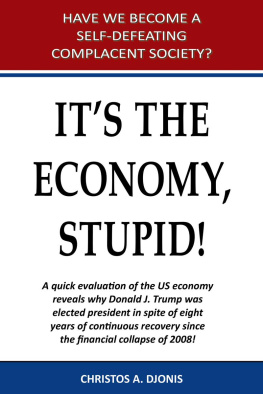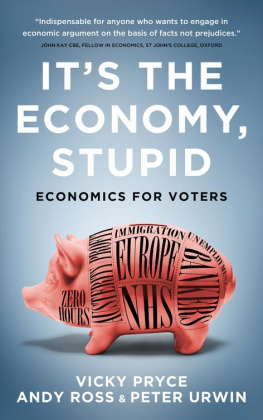It's the Economy, Stupid
Christos A. Djonis
Copyright 2018 Christos A. Djonis
All rights reserved
First Edition
Page Publishing, Inc
New York, NY
First originally published by Page Publishing, Inc 2018
ISBN 978-1-64214-390-4 (Paperback)
ISBN 978-1-64214-391-1 (Digital)
Printed in the United States of America
No part of this book may be reprinted or reproduced or utilized or transmitted or stored in a retrieval system in any form by any means, electronic, mechanical, photocopying, recording, digital or other means now known or hereafter invented without the prior written permission of the author.
From The Author
First and foremost, I must say that I do not consider myself an expert on the economy but more of a serial entrepreneur with opinions about economics, finance, and public policy. I am a professional business owner (as a general contractor, my company renovates large multifamily communities in the southeast US), I am an avid researcher (I genuinely love research work), and I am the occasional author. In the last six years, I have written and published three books, all admittedly passion projects of mine.
My first book, Cyprus : The Island of Aphrodite , published in 2011, is a travel guide dedicated to the Greek island of Cyprus. My second book, Uchronia ?: Atlantis Revealed , published in 2014, touches on several controversial topics and mysteries of our past. In 2017, New York City Big Book Awards voted Uchronia ?: Atlantis Revealed as one of their Distinguished Favorites!
As my last two books imply, it is no secret that like most people, I love traveling, and I find amusing the occasional mystery that can stimulate ones imagination. On a more somber note, though, as in the case of many fellow Americans, I am deeply concerned with the current economic and public policies shaping our country today, which is the real reason behind my latest undertaking.
I started my research on this book in the spring of 2016 and finalized it a few months after the presidential election. During a very heated political year and an exceedingly divided country, I wanted to better understand voter sentiment toward the presidential candidates, the federal government, and the US economy.
Since the market collapse of 2008, I felt that the growing economy which helped the housing market, the banking institutions, and Wall Street recover, did not carry everyone else along with it as it should. Indeed, as I discovered, stagnating and poverty wages, not only in the last ten years but for the past four decades, led to the current crisis where today more than 100 million Americans rely on some form of government assistance. Millions more are barely surviving with income just above the poverty threshold, and lets not ignore that there are nearly three million homeless people in this country, many of them families with children, the fastest-growing segment of the homeless population.
This apparent failure of both the system and the politicians to look out for the well-being of every American, especially those in the lower and lower-middle class, left millions of people feeling neglected. This neglect, which in the last twenty years turned into resentment toward Washington, was more evident during the last election than in any other election in modern times.
My objective was to find the data on this public sentiment and statistically illustrate why political catchphrases like Real Change or Make America Great Again deeply resonated among frustrated Americans on both sides of the aisle, much deeper than election pollsters and the media had expected. I also wanted to demonstrate that the longing behind the political slogan to Make America Great Again in the eyes of most Americans did not necessarily connect the country to some distant tainted past, as some in the media suggested, but for tens of millions of distraught Americans, it meant reviving the American Dream, a dream of a land where life is better, richer, and fuller for everyone.
This book is intended to familiarize the average individual with the fundamentals of the US economy, to help them better understand the essential choices politicians currently make on their behalf, and to allow them to demand better alternatives for themselves and their families.
A government of the people,
by the people, and for the people
shall not perish from the earth.
Abraham Lincoln, 1863
Capitalism is defined as an economic system characterized by private or corporate ownership of capital goods, by investments that are determined by private decision, and by prices, production, and the distribution of goods that are determined mainly by competition in a free market.
Merriam-Webster Dictionary
Introduction
The history of capitalism can be traced back to the early forms of merchant capitalism, which was established in the late sixteenth century in Western Europe. Traders in London and Amsterdam were the very first to creatte joint-stock companies, and from that, the first stock exchanges and banking institutions were founded. In the last five centuries that followed, merchant capitalism evolved into various other types. The following three forms are prime examples of capitalist economies.
Democratic Capitalism
It is a political, economic and social ideology that combines a democratic political system, with a capitalistic economic system. It is based on a private-sector-driven economy, which itself is based on a democratic policy, economic incentives through free markets, and fiscal responsibility. In contrast to corporatism (another form of capitalism), this type of capitalism is controlled by a democratic system that is ruled by the majority. The phrase We the people, for the people, by the people leaves little doubt, at least in the mind of Abraham Lincoln, that the United States as an economic system was fashioned after this form of capitalism.
Interestingly, though, while democratic capitalism stands in contrast to corporatism, the profound corporate lobbying on the American government by special interests in the last thirty to forty years seems to have shifted the power from the people and placed it in the hands of major corporations (see Corporatism).
Corporatism
Corporatism, or corporatocracy, is the sociopolitical organization of society by major special interest groups with affiliations to various businesses in the private sector. This laissez-faire type of capitalism (a policy of letting things take their own course without interfering), which ultimately favors corporations and places them over the needs of people, is an economic system in which transactions between private parties are free from government intervention, such as regulation and tariffs.
A word of caution, though. As innocent as this economic system may appear on the surface, one must not ignore Senator Ron Pauls dire warning that America is slipping into a fascist system where its a combination of government, big business and authoritarian rule, and the suppression of the individual rights of each and every American citizen.
In 2012, at a rally speech given in Kansas City, the former Texas Republican (then a presidential candidate) compared the US economic model with that of Mussolinis Italy of the 1920s to the 1940s, during a time when Italys economic corporatism had similar control over the government. Interestingly, on that very topic, Benito Mussolini quoted something similar. He said, Fascism should more appropriately be called corporatism because it is the merger of state and corporate power.
Social-Market Capitalism
In this form of capitalism, also known as a social-market economy, industry and commerce operate by private enterprise within limits set by the government to ensure equality of opportunity, plus social and environmental responsibility.










